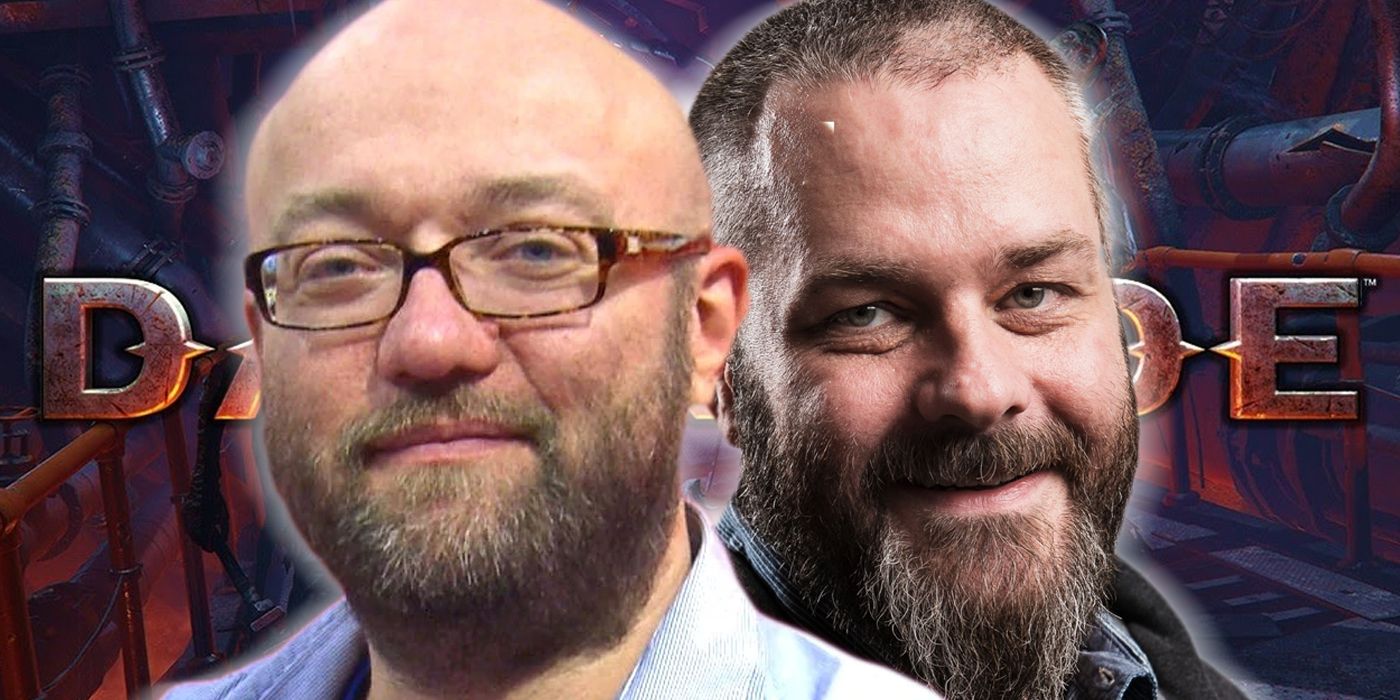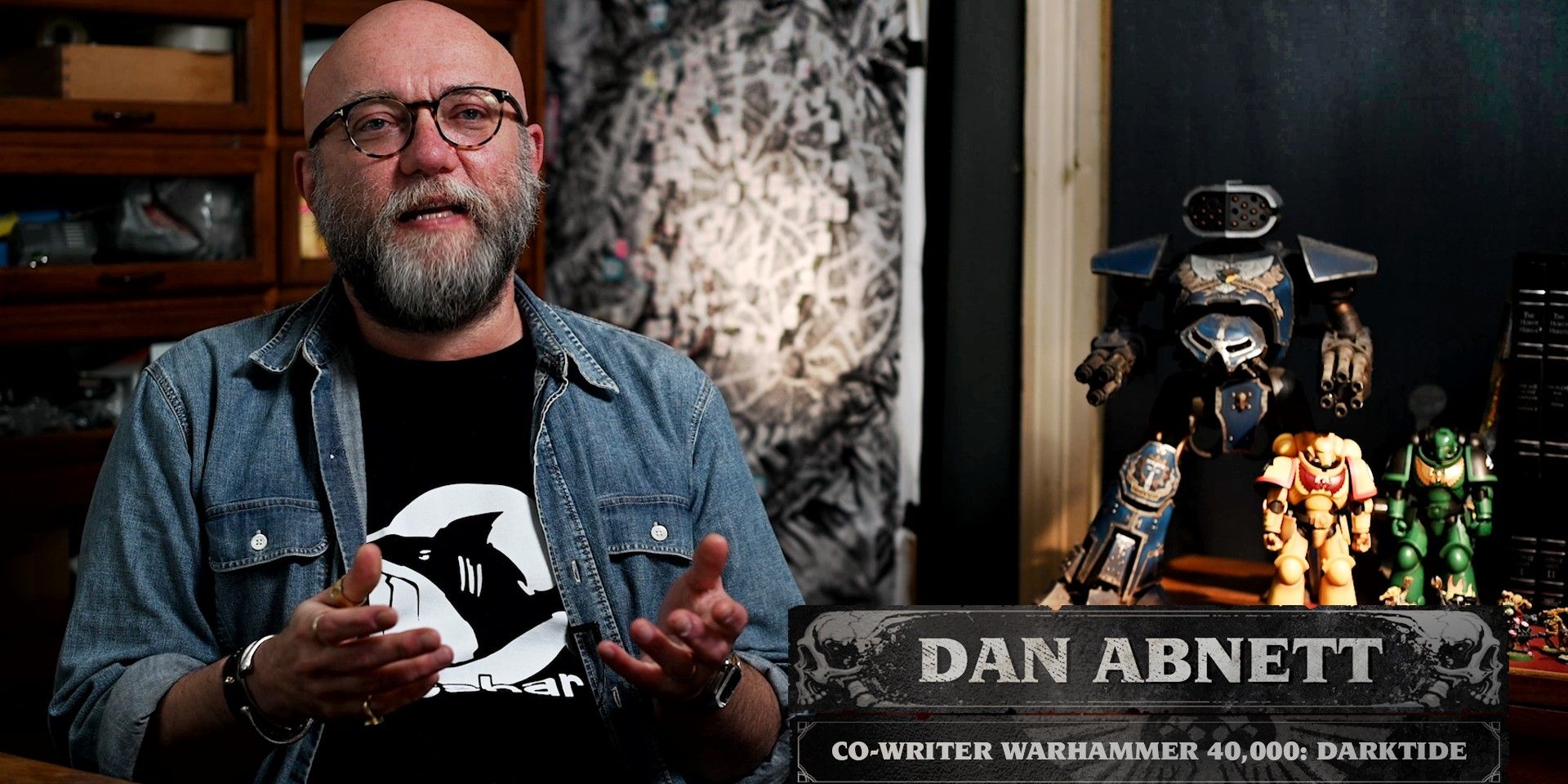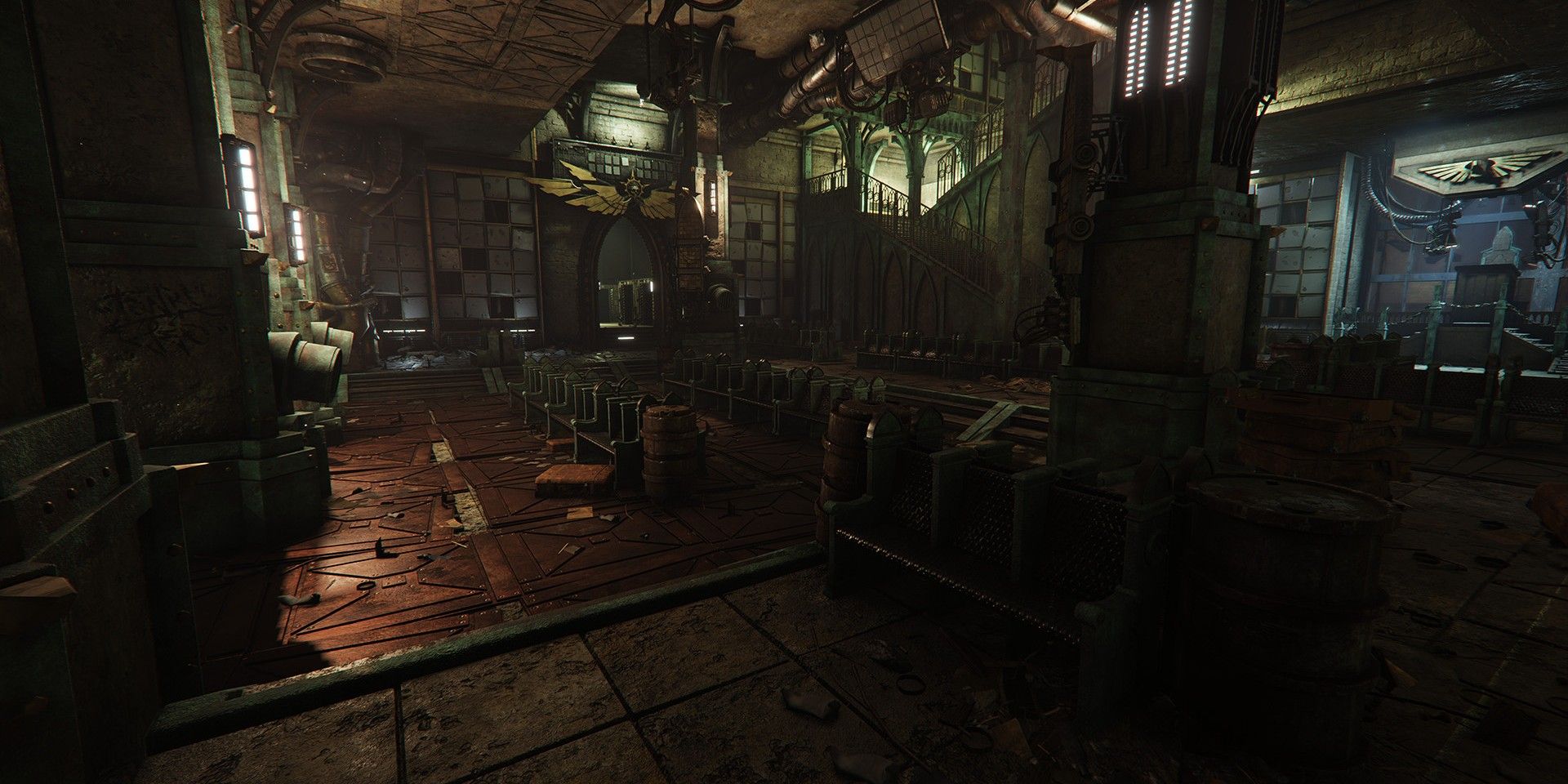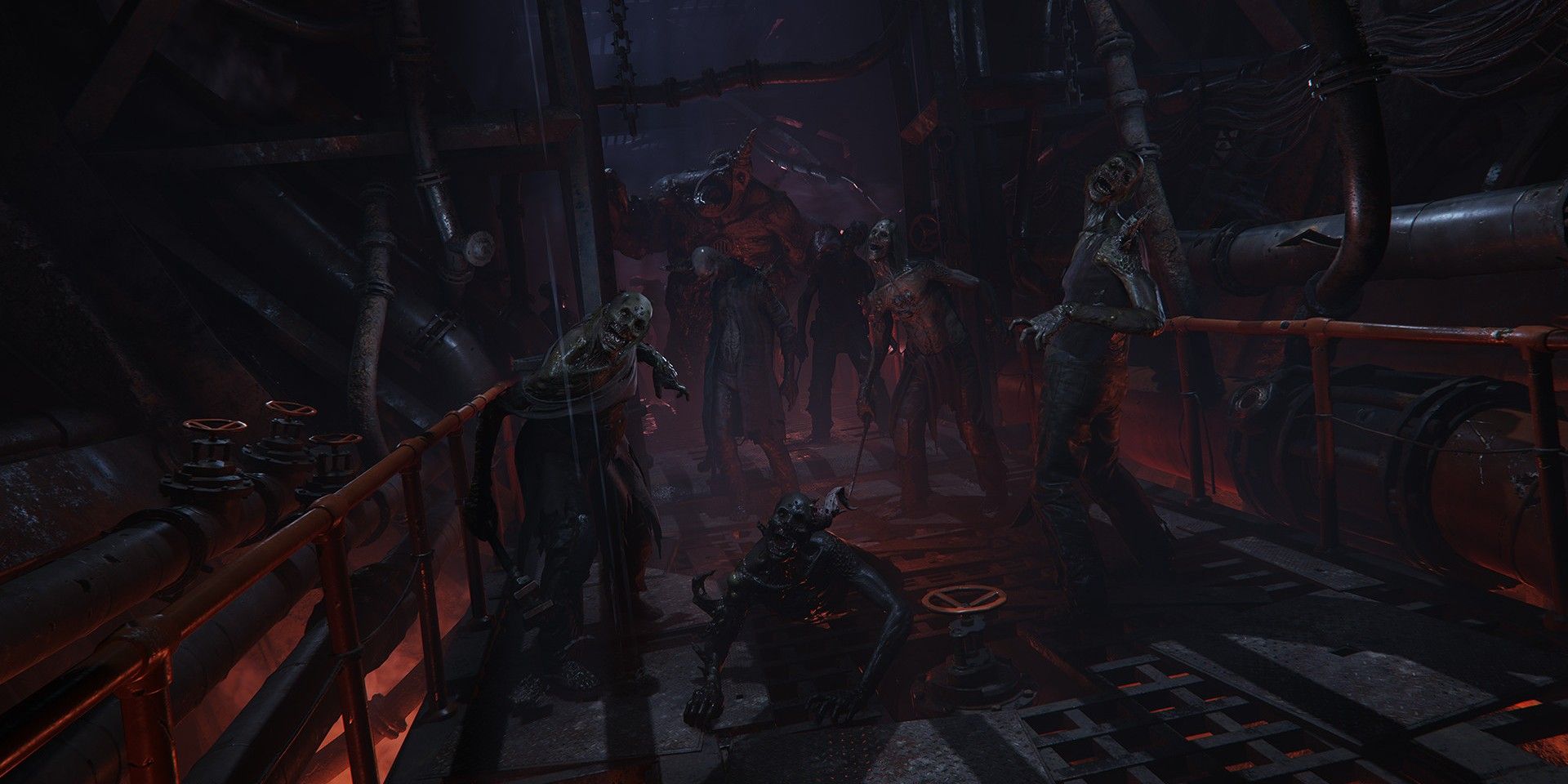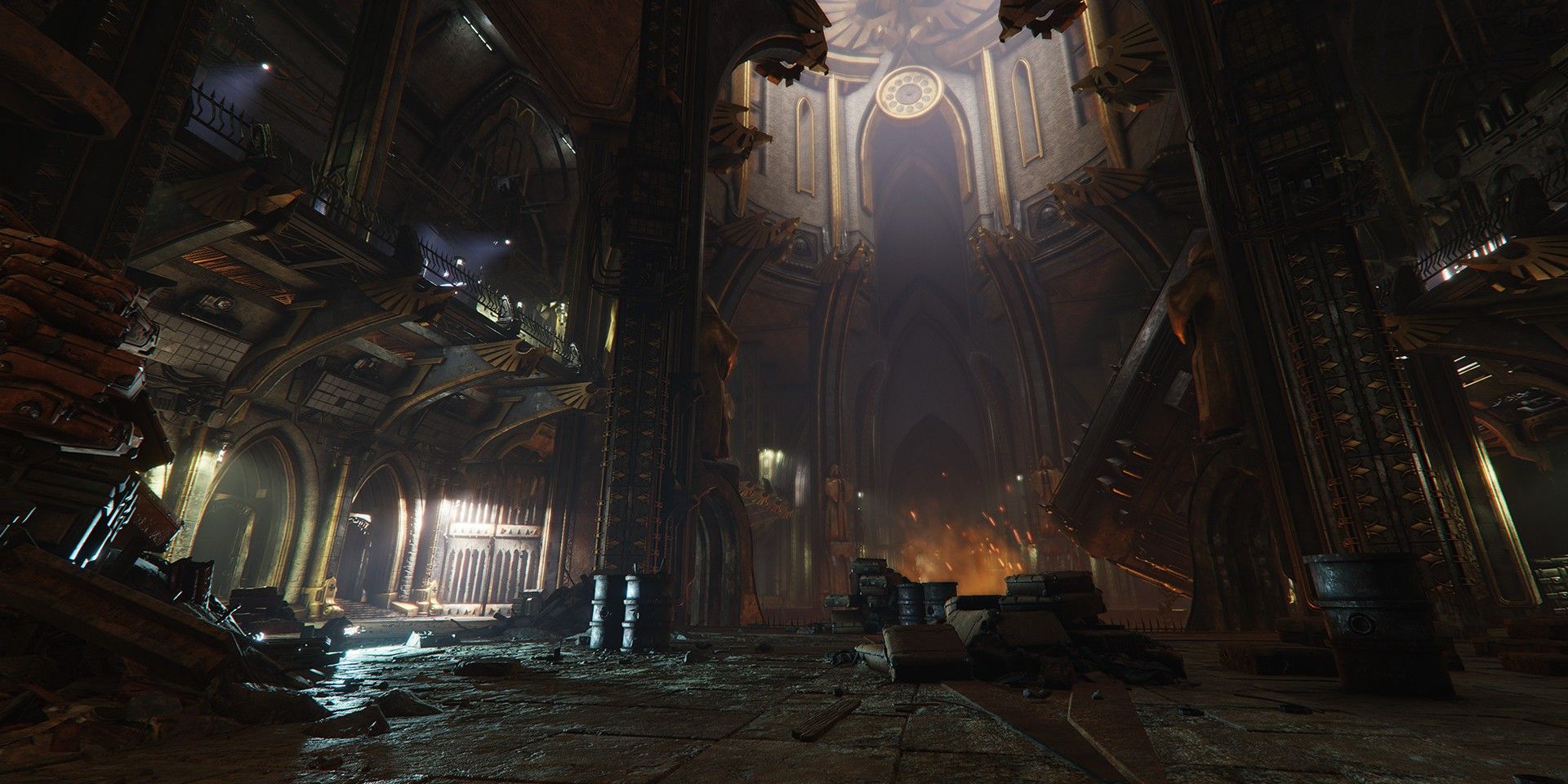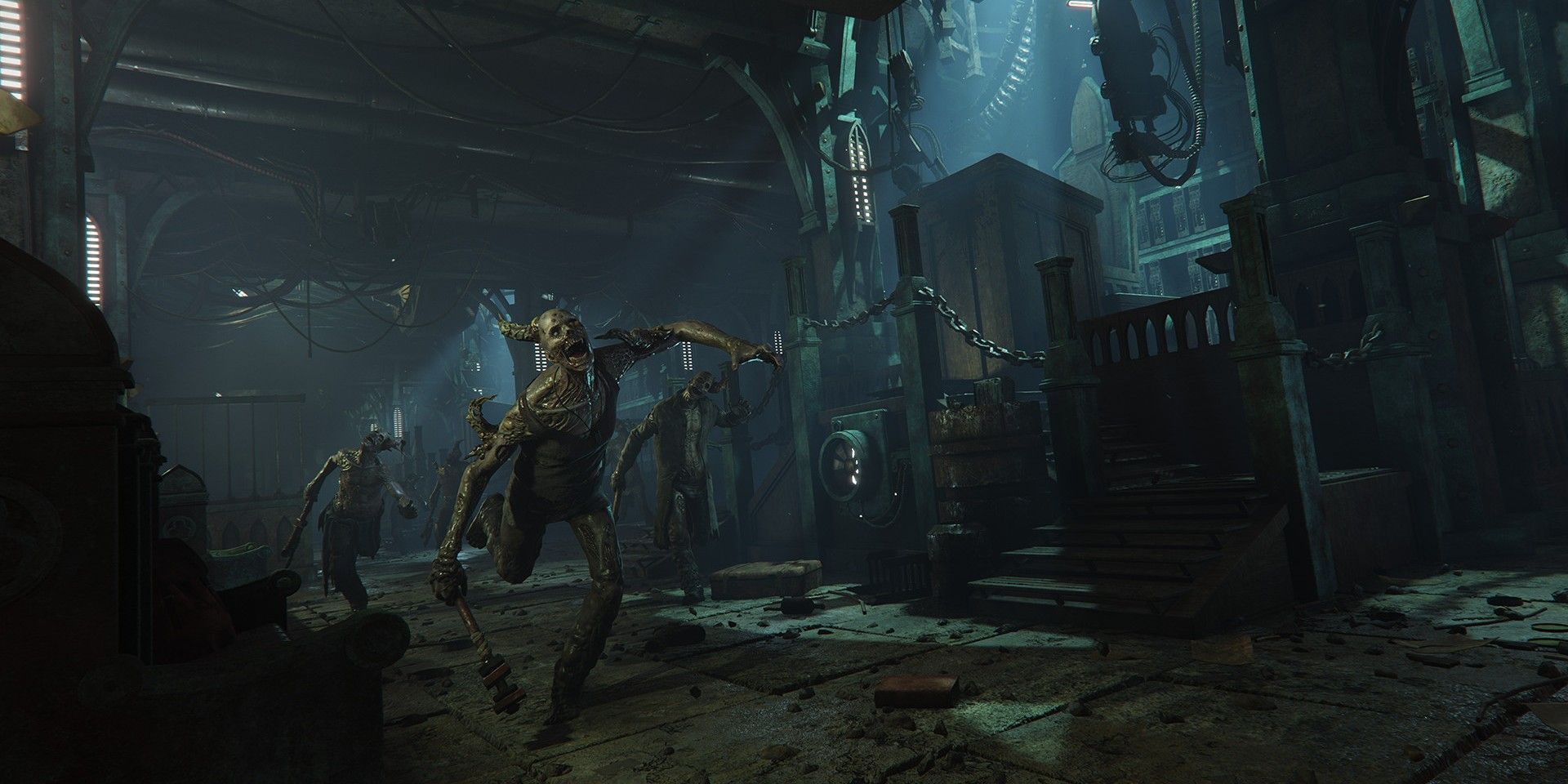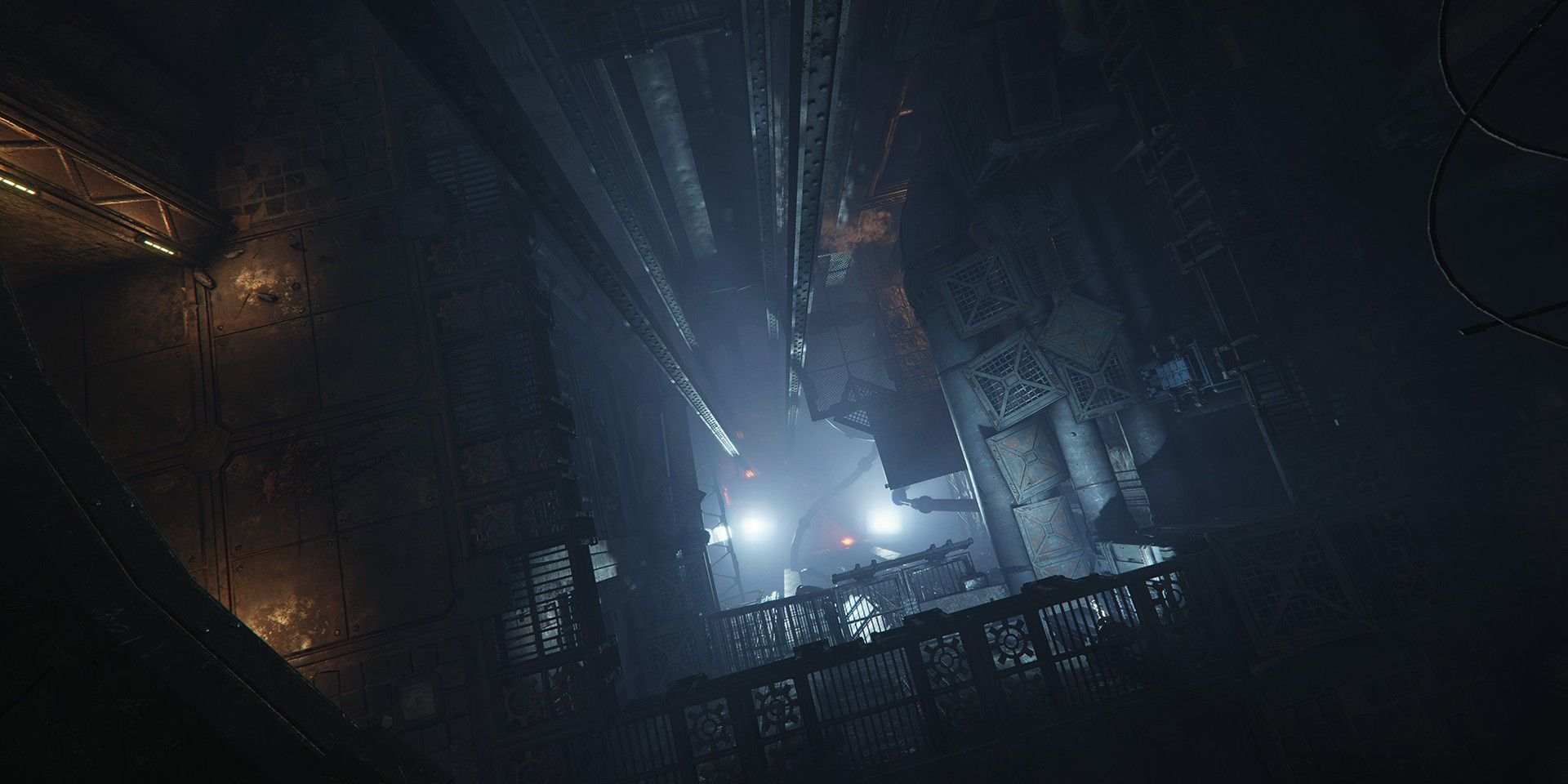Fans of the wildly popular co-op shooter game Warhammer: Vermintide are familiar with development company Fatshark's impeccably designed games. While 2018's critically-acclaimed Vermintide 2 still has a large player base, the company is preparing for the release of its next endeavor: Warhammer 40,000: Darktide. Despite moving into the science-fiction version of the Warhammer universe, the game looks to bring the same 4-player action that fans have come to love.
Warhammer 40,000: Darktide co-writer Dan Abnett and developer Anders De Geer spoke with CBR about their highly-anticipated upcoming game. While neither was able to divulge too much information about the game's novel mechanics and playable characters, they had a lot to say about the grimdark sci-fi universe of Warhammer 40,000, the role of narrative and banter in action-heavy games and the joy of bringing the iconic Lasrifle to life.
CBR: What was your role on Darktide, Dan?
Dan Abnett: I was essentially recruited to, I presume, bring to bear my knowledge of the 40k universe, having written so many novels about it in the last 20 years or so, and to essentially flesh out the structure that the guys at Fatshark have created. They knew what they wanted to achieve, what the game mechanics would be, but obviously, we have a location so there was a lot of world-building to do to actually bring that thing to life, create this amazing hive city that is the focus of the story -- which is a vast thing, it's not just a city, it's a place the size of a continent. So it's an enormous area, a world within a world that can be explored. And to sort of build up the characters that you'll encounter and something to do with the way the plot works, and all of that.
So it was essentially putting flesh on the bones of what they wanted to do. They had some great ideas already, and like the idiots they are, they thought that I was the one to ask, so let's see how that works out for them. No, it was a great fun thing. I mean, I obviously write for Warhammer and write novels and write a lot of comics. But I do work in games and this is a really nice combination of my interest in games and my deep love of Warhammer. So, yeah, I was very pleased to be invited.
What was the order of the creation of characters, mechanics and an overarching story? How much did you have to go on, Dan, when you were trying to flesh out this world? And how much do you rely on Dan's story, Anders, to flesh out the game?
Anders De Geer: I said this to Dan multiple times, but I think Dan was on the project before Dan realized that the project existed. Even before we actually got to work with Dan, we had the whole team read up on Dan's books -- Eisenhorn and Gaunt's Ghosts. I mean, it's mostly because they are portraying the perspective we wanted to achieve in Darktide. So for us, getting Dan was sort of a dream come true. I can't see anyone better knowing exactly the human perspective.
Dan: That's very kind of you to say so. But I think it's very key to that. The Warhammer universe is vast and operatic in its scale and its infamous grimdarkness, which permeates everything. But the iconic thing in Warhammer really is the Space Marine, this sort of unstoppable armored force, which is the sort of the poster child of all things Warhammer. And that's sort of the obvious place to go to in so many stories, the fulcrum of other games and all sorts of different things.
But in the novels I've written over the years, although I have written Space Marines I've almost always gravitated towards the human element, that is to say things like the Imperial Guard, which is the regular human army of which there are billions across the stars, used as cannon fodder usually. Or in books like the Eisenhorn books where we're talking about Inquisitors, which are essentially the special police who patrol the universe looking for signs of heresy and for the infiltration of chaos. They are, generally speaking, essentially regular humans as well. The reason I've always done that is because I think to be a regular human in this universe, although that makes you incredibly vulnerable, it is the best access point for a reader or indeed a player -- it's relatable, you understand what a human being is, so you can communicate the universe very much to them, and also communicate it via them to the reader because they're seeing a human response and a human reaction to things.
So I was really excited when they started to tell me what they had in mind for this game, that it is essentially an inquisitorial mission and you are playing somebody who is essentially human, who is pretty much against your will and given no choice but, recruited to be cannon fodder, to help them serve this mission. It made the game unusual and I think really bravely and interestingly from a human level. You are encountering this environment and everything that is contained within it from the perspective of a human being, which makes you very vulnerable and fragile and also makes your responses to it much more naturalistic. Therefore the player will get to know this universe, I think, much quicker and much more viscerally than if they were just some unstoppable Space Marine force, which often, I'm sad to say, lack personality -- by the very nature of their genetic creation they are lacking in those sort of emotional responses.
And that informs, in turn, in a really exciting way the gameplay because you are vulnerable and the odds are stacked against you. Therefore in order to survive, you've got to trust your friends on your team, your colleagues and your comrades, and you've got to cooperate because you're really not going to stand a chance on your own. So it's both a great way of getting the player to really feel they're in the shoes of the person that they play, a great way to communicate the universe to the player and, most importantly, a great way to encourage the kind of cooperative dynamic that the game is all about. So I thought that was a great idea and obviously, that plays into my particular interest in the universe, the way I write them, so that was great.
Really they had the template in mind, they knew what they wanted to do, they knew what sort of locations they wanted and there was going to be an Inquisitor with a war band composed of key senior members and then there would be people below that, all this kind of structure. So it was a matter of me coming up with ideas that were true to 40k to flesh those things out, but also appropriate to a game because the sort of things you'd invent for a game are not necessarily the things you'd invent for a comic or a novel, they have to work in different ways. We've gone through loads of enormously fun brainstorming sessions doing that.
It's also very interesting to me because, for instance, when I wrote the Eisenhorn novels a long time ago now, the game, the 40k universe, although there was an enormous amount of lore it existed entirely about the battlefield and your experience on the tabletop miniatures game. So when I started writing novels, like Gaunt's Ghosts and Eisenhorn in particular, I realized that I was taking the action away from the battlefield and therefore having to deal with things that really have never been worked out before. So I had to invent worldbuilding, invent an awful lot of things on a granular level in terms of the day-to-day objects that you would encounter. What is, essentially, a telephone call? It's not called a telephone, you know -- all those sorts of things that you would need to deal with. So I actually ended up adding a load of vocabulary to the 40k game just by inventing things that I needed to tell a novel about. And that was enormously good fun because it means you get to really sort of play with things and make a contribution.
Again, now we're working in this environment, the game environment, we're doing that again because in a novel I can direct the reader as to what they're paying attention to, I can walk them through it because, obviously, I'm in charge and they're following me. But in a game, obviously, we want the opportunity for the player to wander around the environment -- it's extraordinary environments -- and explore them and investigate them. So we actually had to start thinking about things that I'd never even had to think about in a novel. Because, as Anders likes to talk about, the idea of, you know, how do toilets work? You're going to find these sorts of things because nowhere is off-limits, you can literally leave the plot and go and look at things. And we need to know, you know, do they have forks? What's that over there? All those sorts of things. And that was really interesting because it makes the world even more thoroughly worked out and authentic because you've actually got to think about those things because they're going to be seen.
Anders: I think we can add also that of course, Darktide is the successor to Vermintide set in the 40k universe. The challenge we have is how do we tell a story? And a lot of it comes from the character banter in Vermintide when they talk to each other and they talk about their environments. And that's also one of the reasons we did want to go with humans -- they could talk about problems in other ways than Space Marines would and they care about each other and other things. But also, like Dan said, environmental storytelling also becomes hugely important because we don't have that many dialogue trees and we don't have that many gameplay ways of telling the story, so then the environment becomes super important.
What is the role of an overarching narrative in action-heavy games like Darktide?
Dan: In this particular instance, in Darktide, it's about the investigation that you're conducting, and actually that cleverly explains why there aren't Space Marines as well because we have this enormous hive city, which is a vital asset -- it's a really, really important place, it controls the local sub-sector, it's very important to the Imperium. So when they first detect the idea that there is something bad going on deep in its depths, perhaps the taint of chaos, a chaos cult or something, they don't just want to steamroller in with the Space Marines to just flatten the place and nuke it from orbit because they'll lose something very important to them.
So the Inquisitor -- the Inquisitors are enormously powerful in terms of their authority, they can essentially determine exactly how they're going to pursue an investigation -- the Inquisitor has come in first to send his agents into the hive, to track down any information they can get, to discover any traces of the cult, to close it down where they can find it. Because it's the only way of trying to uproot it completely and get rid of it and retain the structure of the hive without either destroying the hive or just forcing it underground so they can't find it anymore. So it is sort of a procedural, it's a sort of investigation -- you're going on missions to learn things that you can then bring back and add to the collective whole about what we know about the enemy. Where is it hiding? What's it doing? What's its motive? How's it operating? That kind of stuff.
But it's not just a police procedural inasmuch as it is a very violent thing, just as Vermintide was. The cult is not going to give up its secrets easily and it's going to be very, very nasty. You're finding yourself in this role of kind of a foot soldier who is out gathering information. You've also got to, by achieving things, win the trust of the Inquisitors so they take you more seriously as an asset in their team. And as I said, it is a dangerous thing. There is a very strong element of survival horror because you're up against some completely appalling things. This isn't a particular spoiler, but the nature of the cult is that it is aligned to one of the chaos gods called Nurgle, which is the god of disease, which is just horrific. It's not one of the glamorous chaos gods, let's put it that way. So it's not one you want to go, "Sign me up, that looks good!" This is really, really quite a lot of body horror, a lot of very unpleasant things going on. I think that's a great thing to experience in a kind of cooperative environment because you actually are reacting to these things.
But the action -- what I've seen of it, what they've been able to show me so far -- is sort of amazingly visceral and exciting. We're getting to see some classic elements of the 40k game that previously have only ever been written about or have appeared as plastic miniatures on the table -- things like the classic Lasrifle and things like that, which are sort of iconic to the game. But now we actually get to see them being wielded, we can see the heft and weight of them and how you load them and what their firepower is like and all that kind of stuff. Which is, to me, incredibly exciting, because these are the things that have just existed in my imagination for the longest time and now they're showing it to me, and that's really very, very good indeed.
RELATED: Star Wars: Republic Commando's New Port is Still One of Star Wars' Best Shooters
There's a great atmosphere of suspense and when things kick-off, they really kick off in all sorts of different ways. I think certainly the difference, and Anders can speak to this much more effectively than I can, but obviously, the big difference with this and Vermintide is the ranged combat, the fact that you've now got firearms is a very big deal because it's not really something that factored into Vermintide because that was mainly hand-to-hand and melee. I don't know if, Anders, you want to talk about how ridiculously difficult that was? Trust me, it was difficult.
Anders: I can definitely add that going from Vermintide to Darktide, one of the first and major gameplay issues we had was we realized that the ranged combat would be the biggest challenge of the entire project, getting both a local focus from the player's point of view on the ranged combat but also from the enemy's. We don't have that many ranged enemies in Vermintide.
What are the differences as a writer between treating the Warhammer fantasy universe and the Warhammer 40k sci-fi universe? Do you approach these in different styles?
Dan: Yes, you do. I think that you sort of start with the obvious tropes of difference between combat sci-fi and fantasy and sort of work back down from there. But both Warhammer universes, I have to say, I think have got really distinctive characteristics, they have a very unique flavor. I've said before, but of all the great franchise universes that you could be a fan of, almost every single one of them has an aspirational element -- Star Trek fans want to join Starfleet and Doctor Who fans want to travel in the TARDIS and Star Wars fans want to join the Rebel Alliance or the Empire, I don't know. They are places that you'd like to go as a fan. I've never ever met, in 20 years of doing it, a Warhammer fan who wants to go to this universe. It is stupendously horrible.
However, it is fantastic. Both universes actually have got this extraordinarily distinctive look, this sort of grandiose, epic Gothic feel to it, which means that it's sort of unmistakable. You can't confuse this with any other universes. It's got that very, very great quality. And although people think about both of them as being terrifically dystopian, unpleasant places where the life expectancy is low and the quality of human life is extremely grim, I always argue that actually, that contrast makes the human qualities more worthwhile. The idea that in both universes you are trying to express courage and comradeship, to claw back even just five minutes or a moment of safety against this very, very dangerous universe, which I think makes those values count for more. Nobody in 40k or Warhammer ever thinks they're going to change the world -- "If only we can win this battle, everything's going to be better from now on!" There is that grimdarkness of the far future but I think it's a really interesting way of presenting the sort of human condition in there. It's actually weirdly so negative it makes the positive feel more positive.
I think that comes out of the fact that people sort of underestimate quite how much of Warhammer and Warhammer 40k came out of the '80s in the UK and some of its sort of contemporary things that started around about the same time, things like 2000 AD and Judge Dredd and that kind of stuff. They were all essentially satirical responses to the Thatcherite government and what life was like back then. So there is a huge element of knowing satire and commentary within them and in things like Judge Dredd that is sort of on the nose. It's obvious that it's a sort of a satirical take on the fascist police state, I suppose. In Warhammer, I think it's more deeply hidden because it's also a game and people get lost in the sheer fun of playing it, but I think it always comes back to that.
There is that sort of Maverick and iconoclastic feeling that gave rise, for instance, to the alternative comedy movement in the UK in the '80s and that kind of stuff. But it came out of the same kind of mindset -- it's not that the creators just went and made the darkest thing they could possibly make as an end to itself. They made it dark because that was the vehicle with which they could transmit that idea of the individual and stuff like that. And I think so many years on it's kind of easy to forget that's where it's coming from, but I think people who maybe don't know the universes very well or choose not to play them, they think, "Oh, is that the ridiculously over the top nasty one?" And it's like, well, it's kind of not -- there is a layer of something in there that you're missing, that you're not sort of understanding where this originated from.
What can you tell us about the playable characters in Darktide?
Dan: I think we're sort of limited, if I'm right, in saying too much detail there, but I think there are really interesting options that you can play around with. I think that it is both a dynamic between those characters that you can play and also, as I say, the sort of named characters who play a role as mission-givers and trainers and mentors, where there is a sort of second story going on behind the scenes about how you integrate into that crew and win a place or not, depending on how well you do and sort of establish that trust in the other direction. So I think thematically it's extremely appropriate to 40k that it's all about what you know -- who can you trust? Who can you rely on? How long can you survive in this, if you haven't got anybody you can count on? And the options do certainly do reflect that. I know that they said, "Don't talk about that too much," but I think that's a fair thing to say.
Anders: Definitely -- I mean, we are not allowed to talk specifically about the assets, unfortunately, because we would love to. But we're not allowed at this point to go into this.
A fan-favorite of the Warhammer games is the banter between characters — Dan, were you involved in this writing of dialogue too? And how much can you tell us about this famous banter in Darktide?
Dan: Most of what I've been doing so far has been establishing the principal characters and doing a lot of the worldbuilding. I think there will be what we might describe as banter sessions to come. But yes, it is certainly an absolutely key part of it. I think it's part of the trick of making Warhammer 40k work extremely well. This is true also in the novels as well -- if you don't have those personalities talking and possibly making really grim black humor jokes in the middle of things it does become relentless because it is such a difficult thing to deal with a different universe.
I certainly found my Imperial Guard novel series, Gaunt's Ghosts, which I think is now -- I've lost count -- 15 [books] or something like that, yes, it is military SF and it's about the combat experience of soldiers on the ground, but to me, it's sort of a gigantic soap opera that happens to have battlefield action in it. To me, it's all about those characters. It's how they interrelate, it's the running jokes, it's the conversations they have with each other, it's how they managed to keep their morale going in the toughest times, that kind of stuff. And that's definitely something that we want to translate into this. If nothing else, because it works so well in Vermintide. It's a crucial part of that experience, so yes.
Anders: Definitely.
Is there something similar about writing for the visual nature of video games and comic books, or are these formats just wildly disparate?
Dan: Well they kind of are and not at the same time. I sort of always think of myself as just a writer and sort of an imaginer of things, in terms of building an interesting world or environment in which to set a story, building interesting characters to play that out, and that kind of stuff. Then I think, depending on what I'm working on, it's really a matter of channeling that imagination and that creativity into, as it were, the right format. So if I'm writing a comic, it's how do I give this the most compelling visual storytelling? What are the interesting things I could do here? Because that's going to be the primary carrier of the story. So the sort of story I would write for a comic is definitely not the same sort of story that I would write for a novel, even if it's got the same characters in it -- they work one way around, I exploit different aspects of the story in prose to the ones that I do in a comic.
I think the same is true here as well. It's an interesting learning curve, although I've been working on games for quite a long time now, all sorts of really interesting and challenging things, I never considered myself to be a game expert. What I bring, I suppose, is story and what I'm trying to learn as I go along is the completely new techniques that you have when essentially one is no longer in charge of the story because one wants to give agency to the player, which is obviously something that never happens in the comic or a novel. So you are trying to construct things in ways that will either give a properly organic story experience to the player, almost tailored to them, depending on how they choose to play the game, or at the very least, and this has been the case in some other games, the illusion of that, so they feel that they have some agency and volition, which is a really interesting thing to do.
As we went along, once we cracked some of the mechanisms we were going to use to do that, everything sort of fell into place beautifully because it sort of made sense. We can have, for instance, players playing side-by-side who maybe have started the game at different times and have experienced more or less. We're not going to get people duplicating their experience just because their friend is trying to catch up with them because every day is a new day. You're just like, "Well, you joined the war-band after I did -- maybe I'll be able to tell you some things, but what we're going to find and see are going to be new." And that's a really interesting thing.
Weirdly, it's been nice, after a few years of doing this sort of thing, that sometimes I've discovered things about the way story works in the sort of the open way a game does, where there are options and changes that are taken by the participant or by the player. There are things I've learned about story there that I've exported back into prose and into comics because you get to see stories in a different way. You think, "Oh, wait a minute, if that works there, how can I do that in a different way?" I suppose it's made me more open to, if nothing else, spontaneous change within novels. Sometimes you can work on a novel for months but you might have your plan upfront and you go, "Well, I can't vary from that, because I've planned it all out there."
But actually, sometimes you don't get all your good ideas in one day. And you might be three months into a novel working where it's like, "Wait a minute, I could do this." Whereas before I'd have gone "Oh, I'd better not in case everything collapses," I think seeing the fluidity of the way a game can work and the way a game could sort of spontaneously generate things based on the choices that somebody makes in the middle of it, I have in my last couple of novels incorporated really big ideas that have happened to me late in the day and gone, "Wait a minute, this does change everything, but it changes it in a really good way." So I can say you sort of learn across formats, even if basically you're employing the same skills into integrating something.
Anders, you've talked about the long-distance combat being a changeup from Vermintide. Are there other differences in the mechanics that you can talk about, anything new that players should be excited for?
Anders: I don't know exactly what I'm allowed to talk about. But I mean, of course, it's a new IP, and there's a ton of things that we needed to consider or reconsider that sort of fits Vermintide but not necessarily Darktide.
Dan: I was gonna say, certainly, communication is a key one -- you were saying that just the other day, actually, about the fact that in this you can as a player talk to people who are not present with you because the technology exists in the 40k universe in a way that it doesn't in Vermintide.
Anders: Yeah, I mean, there are small things. A funny thing when we talked about the decision of actually doing a 40k game and we instructed the team, at a point I remember one of the level designers being overly, extremely happy about us having electricity. When you think about it, it's like Vermintide is only lit by natural light or torches or stuff like that. We can't use electric doors or that kind of stuff in Vermintide. So even that opens up a huge opportunity of creating things that we couldn't do in Vermintide. That goes for almost every part of the game.
Also both Vermintide 1 and Vermintide 2 have taught us a whole lot, especially Vermintide 2 since our player base is still big and we still see how they interact with systems and what works and what works less good. So we're still learning. There's a lot of stuff that we not only change because of the IP but also because we have ideas about improvements we could do or approach problems in a new way. So there's a lot of smaller things, of course, many of them, the bigger ones we can't really foreclose.
Is there anything else you'd like to share with fans?
Dan: Oh, probably but we're probably not allowed to say it so we better not.
Anders: There's so much we want to say but I don't know if we're allowed.
Warhammer 40,000: Darktide is developed and published by Fatshark and includes writing from Dan Abnett. The game is slated for release in 2021.

